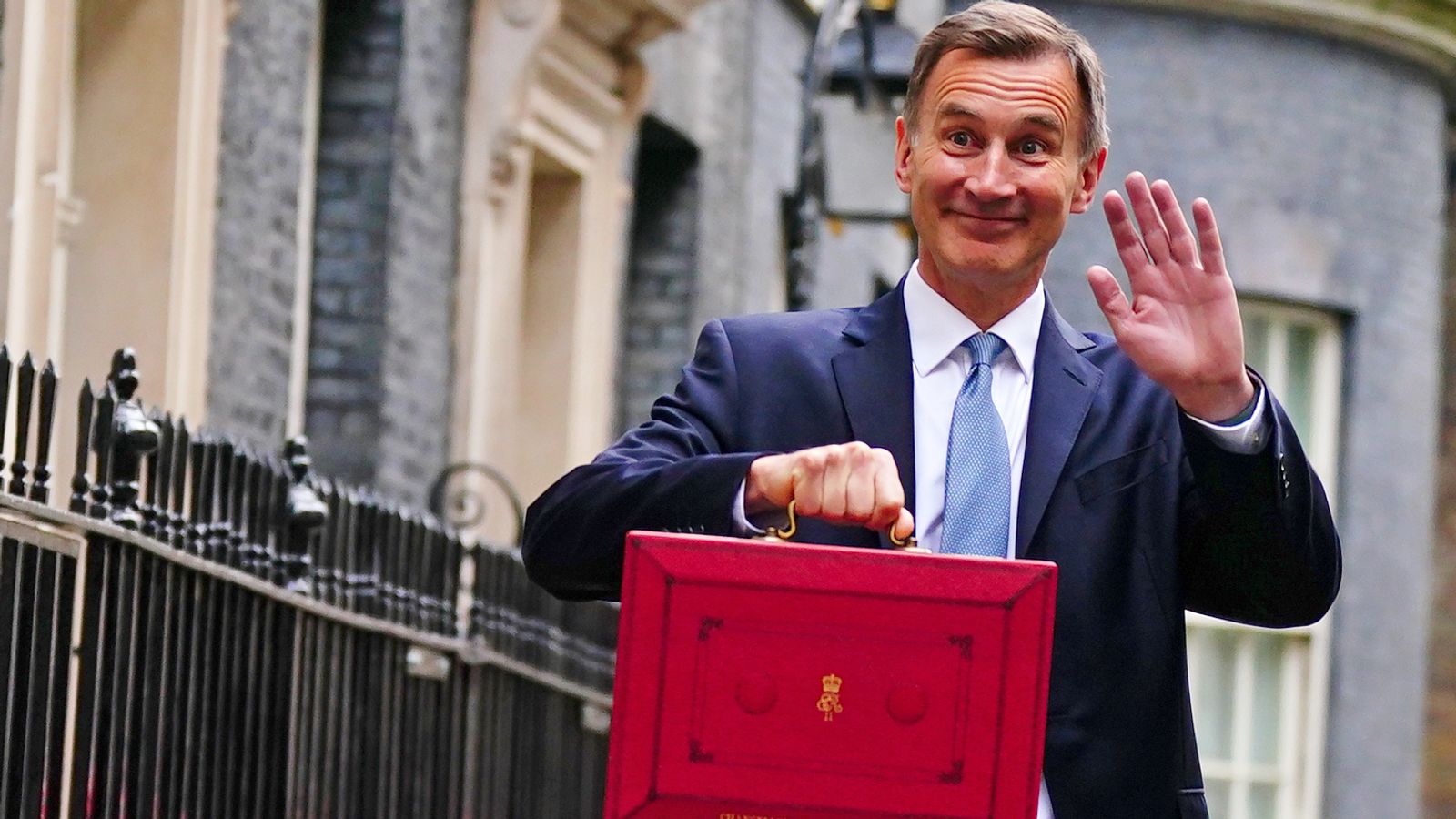Jeremy Hunt is preparing to deliver his second spring budget since taking over as chancellor, in what could be the last big fiscal moment before a general election.
Here’s all you need to know about when it will be and what it might contain.
When is the budget?
This spring budget is on Wednesday 6 March.
The budget is accompanied by economic and fiscal outlooks from the Office for Budget Responsibility (OBR), the independent public finances forecaster.
What time is the announcement?
Chancellor Jeremy Hunt will deliver the budget statement in the House of Commons.
Can the spring budget reverse Rishi Sunak’s electoral fortunes?
Could a February budget give the government more wiggle room?
Jeremy Hunt to set out Autumn Statement on 22 November
The announcement usually starts at 12.30pm – directly after Prime Minister’s Questions – and lasts about an hour.
Labour leader Sir Keir Starmer will give his response as soon as the speech is over.
Before the announcement, the chancellor poses for the press with the red despatch box containing the budget papers.
What is included in the budget?
The budget lays out the government’s plans for raising and lowering taxes.
The chancellor will also speak on government plans for public spending, including on schools, health and defence.
The statement tends to start with a review of the nation’s finances and its economic situation, moving on to the proposals for taxation.
Could there be big tax cuts in this budget?
Mr Hunt has cast doubt over introducing big tax cuts during the budget, saying he is unlikely to have the fiscal “room” he had in the autumn, when he cut national insurance by two percentage points from 12% to 10%.
He had previously said the government’s plan of “prioritising tax cuts” was working, and that it would “stick to it”, but then confirmed he warned the cabinet he may not be able to go that far.
But with the next general election fast approaching, the chancellor will be looking to make an attractive offer to voters.
With this in mind, Sky News understands he is looking at cutting planned public sector spending in order to lower taxes.
Please use Chrome browser for a more accessible video player
He is thought to be considering lowering his planned 1% real terms rise for public spending to around 0.75% post-2025, which could give him up to £6bn to spend on tax cuts.
Asked by Sky News if tax cuts could be expected in the budget, Mr Hunt said: “Chancellors don’t talk about budgets just a few weeks before, and that is for a very good reason because I don’t yet know the final numbers that I will receive from the Office for Budget Responsibility.
“But what I would say is that I do believe if you look around the world, the economies – like the United States and Canada which have lighter taxes, particularly lighter taxes on business – tend to grow faster.
“But I would only cut taxes in a way that was responsible and I certainly wouldn’t do anything that fuelled inflation just when we are starting to have success in bringing down inflation.”
In a major intervention, the International Monetary Fund (IMF) said that Mr Hunt should not be planning to cut taxes.
The economic body said measures such as preserving high-quality public services and undertaking “critical” investments to boost growth required higher spending than was currently reflected in the government’s budget plans.
What else could be announced?
Towards the end of last year there were briefings in the newspapers that Rishi Sunak could cut inheritance tax – which is paid by around 4% of the population – but Downing Street dismissed the report as “speculation” and refused to comment further.
At present it is charged at 40% and applies to estates worth more than £325,000, but there are allowances that can mean it’s only paid on more valuable estates.
The chancellor is considering bringing in a “vaping products levy” that would make importers and manufacturers of vapes pay more for the liquid in them, Sky News understands.
It’s understood the government hopes the added costs to make vapes would trickle down to the consumer, making them less affordable, particularly for children and young adults.
Also, amid heightened threats to the safety of MPs, Sky News understands there is a package of extra money to provide additional security measures under consideration, and The Sun reports it will be around £15m.
What happens after the budget announcement?
It depends on what is in the statement. If the chancellor announces changes to taxes, then legislation may need to be brought in.
It may be that no big changes are announced that will come into force before the next budget – in which case, nothing more will happen.
What did the chancellor include in his spring budget last year?
Overall, it was a heavy spending budget, funded by borrowing.
Among the headline-grabbing announcements was the introduction of 30 hours of free childcare per week for children aged over nine months with working parents by September 2025.
He committed to increasing funding for nurseries providing free childcare to £288m.
He also scrapped the limit on tax-free pension savings and extended the pensions annual tax-free allowance from £40,000 to £60,000.
The chancellor said he decided to make the pension changes following warnings from senior NHS clinicians that unpredictable pension tax charges were forcing them to leave the NHS early “just when they are needed most”.
Why is there a budget every year?
There needs to be a budget in every financial year because income tax and corporation tax are annual taxes which have to be renewed by legislation each year.
What’s the difference between the autumn and spring statements?
While the last budget was in March last year, you may also remember the chancellor’s autumn statement on 22 November.
In 2017 the government introduced a change that was supposed to mean the budget would take place in autumn, and a spring statement would be delivered shortly before the start of the financial year on 6 April.
This was to ensure the UK had a “single major fiscal event” each year, in line with other countries.
The idea is that the autumn budget is the main event, addressing taxation policy, while the spring statement provides an update on the state of the economy.








